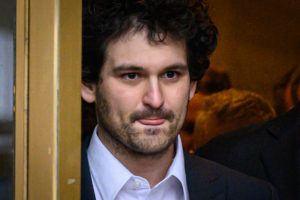By now it’s a cliché that liberalism in the Anglosphere has become a religion, whether or not its adherents know it. But less often remarked is a fact somewhat in tension with this claim: namely, that its worshippers get to be minor gods too, making up the moral rules themselves. The past few weeks have offered up two new case studies for us to contemplate. The first involves a married couple from the US, Malcolm and Simone Collins, described as the “poster children of the pronatalist movement”, now thrust into an even wider media spotlight courtesy of a viral Guardian interview about their lifestyle. The second is a book by political philosopher Alexandre Lefebvre, Liberalism as a Way of Life, published on Tuesday.
Since the article about the Collins family first emerged a fortnight ago, most scandalised public reactions have been about the fact that father-of-four Malcolm was observed slapping his toddler’s cheek in a restaurant — albeit that the reporter noted it was “not a heavy blow”. Collins said the practice was agreed with his wife beforehand and modelled on their having watched “tigers in the wild” disciplining their offspring with the swipe of a paw. (Let us hope they didn’t also see the part where an adult tiger sometimes kills a cub for food.) This week, he wrote a further defence, blaming “much of the media” for being “hell-bent on presenting pronatalists as evil and backward”. To my mind, though, Malcolm and Simone could do with being a bit more backward; for even leaving their disciplinary habits aside, they seem to constitute the reductio ad absurdum of attempts to freestyle the moral universe.
In the Collins’s world, every stage of the childrearing process is approached as if to be redesigned from scratch. For instance: the couple have given their two little girls “gender-neutral names” — Titan Invictus and Industry Americus — apparently on the grounds that this will make the girls “more likely to have higher paying careers and get Stem degrees”. The fact that future employers are bound to presume such names could only have come from a terrifyingly crazy bloodline seems to have been discounted. A further justification offered by Malcolm is that such “strong names” will predispose their owners to “a strong internal locus of control”: that is, to that inner feeling, identified by psychologists, of being fully in command of whatever happens to you in life, as opposed to a helpless passive drifter. Clearly, he hasn’t imagined having to spell “Titan Invictus” out over the phone.
But doing things differently is apparently the Collins’s way. They selected their IVF embryos for predicted intelligence as well as health before implantation. They chose the location of their Pennsylvania family home partly on the basis of the number of Nobel laureates produced in the region. They get up between “two and five” each morning to work before the children wake. Their two boys — Octavian George and Torsten Savage, aged four and two respectively — walk around the house with iPads strapped around their necks. And in case you worried that spirituality was missing from this touching scenario, the family follows an “intentionally constructed religion, technically atheist” religion, in which Christmas is replaced with “Future Day” for the kids. On the night before Future Day, “the Future Police come and take their toys, and then they have to write a contract about how they’re going to make the world a better place, and they get their toys back with some gifts and stuff”.
Putting this material all together, there could be few better adverts for the wisdom of crowds. As perhaps their “one weird trick” approach to parenting already suggests, Malcolm and Simone are effective altruists — part of a movement attempting to hack ethics, and maximise benefit-cost ratios in utilitarian decision-making. Saving the future of humanity is high on the bucket list of the founders of effective altruism, and they tend to talk as if hypothetical future humans were just as interesting as actual ones. Or as Malcolm puts it: “The kids who I haven’t had yet… are just as precious to me as the kids I already have” — a sentiment that is either good news for his future kids or bad news for his present ones, depending on how you take the remark.
The existence of the Collinses — and indeed of effective altruism in general — casts an interesting light on the central thesis of Liberalism As A Way of Life. Author Lefebvre argues that since liberalism is the “the water we swim in”, we might as well propel ourselves along with the current, and self-consciously turn its elements into a religion fit for modern times. That is: rather than continuing to pretend that the battered but still-dominant political ideology in Europe and the Anglosphere is neutral between competing conceptions of the good life, we should just admit that — at least for those atheists already steeped in it — liberalism and its contents is the good life. Once this is acknowledged, we can start positively aiming at liberal values in a more enthusiastic way, as spiritually rewarding objectives in their own right.
At the moment, argues Lefebvre, we are stuck in “liberaldom”: the sinful version, an uneasy admixture of liberal principles and other competing ideologies such as capitalism, nationalism, racism and patriarchy. Confined in this purgatorial space, what we tend to find admirable, desirable, erotic, funny, outrageous or offensive is shaped by everyday acquaintance with historically influential liberal ideas and their offshoots. In trying to establish this otherwise extremely plausible point, Lefebvre ventures one of the least persuasive, most naïve, and funniest explanations ever offered for the massive interest in incest porn on the internet — according to which “the taboo being busted … is not the prohibition on incest. It is merit: the [liberal] idea that reward should track talent, achievement and effort.”
Yet were we to grasp that the “core” of true liberalism is a “fair system of social cooperation over time, from one generation to the next” — the key idea of John Rawls’s liberal egalitarianism, as elaborated in his magnum opus A Theory of Justice — then according to Lefebvre, we would be moved almost seamlessly towards a wholehearted endorsement of further progressive ideals: redistribution, reciprocity and mutuality, a meritocracy, and so on. And we would also become much better people, he thinks. In a variation upon Paul’s first letter to the Corinthians, it turns out that it is liberalism, not love, that is patient and kind, does not boast, and is not proud. It is even, Lefebvre suggests, “light, ironic, fun, and playful”.
Once past the wincing, there are a lot of questions to be asked about all this; not least, about why the supposed core of liberalism has to be fair cooperation, rather than freedom from interference, positive self-development or any other of the rather disorderly political category’s most famous historical elements. But for present purposes, a more salient point is that effective altruists like the Collinses are also aiming for a fair system of cooperation; though clearly their conception of “fair” is different to that of many others, and involves debts to future people as well as present ones.
In terms of moral character, though, these people seem obvious counterexamples to Lefebvre’s hagiographic account of the supposedly well-realised liberal spirit; not so much kind, humble, generous, and playful, as cold, somewhat arrogant, and monomaniacally obsessed with pursuing their own particular moral vision, with no idea when or where to stop. Along with many other archetypes in the present-day liberal universe, they give the lie to the comforting fantasy that focusing on progressive goals makes you a better person.
The bigger point against Lefebvre, however, is that aiming for as vague an outcome as “a fair system of social cooperation” could never be a very satisfying religious precept, no matter how badly atheists may unconsciously need one. It leaves far too much open — what counts as fair? Indeed, what counts as social cooperation? — and there is too much room for disagreement about what such a system looks like in practice. It is true that all religions have their hermeneutic traditions; but still, in arguing, there is a reliable sense of discovering something that was already there. In a godless world, however, the “discovery” of a detailed new set of precepts feels uncomfortably close to creation.
To put morality in the realm of discursive rationality, as liberalism effectively tells us to, automatically means the most you ever will get are thousands of clashing sects. For spiritual engagement, at some point you have to feel like you are following somebody else’s rules. And with present-day liberalism, it too often feels as if — just like the Collinses — we are making things up as we go along.
Disclaimer
Some of the posts we share are controversial and we do not necessarily agree with them in the whole extend. Sometimes we agree with the content or part of it but we do not agree with the narration or language. Nevertheless we find them somehow interesting, valuable and/or informative or we share them, because we strongly believe in freedom of speech, free press and journalism. We strongly encourage you to have a critical approach to all the content, do your own research and analysis to build your own opinion.
We would be glad to have your feedback.
Source: UnHerd Read the original article here: https://unherd.com/



